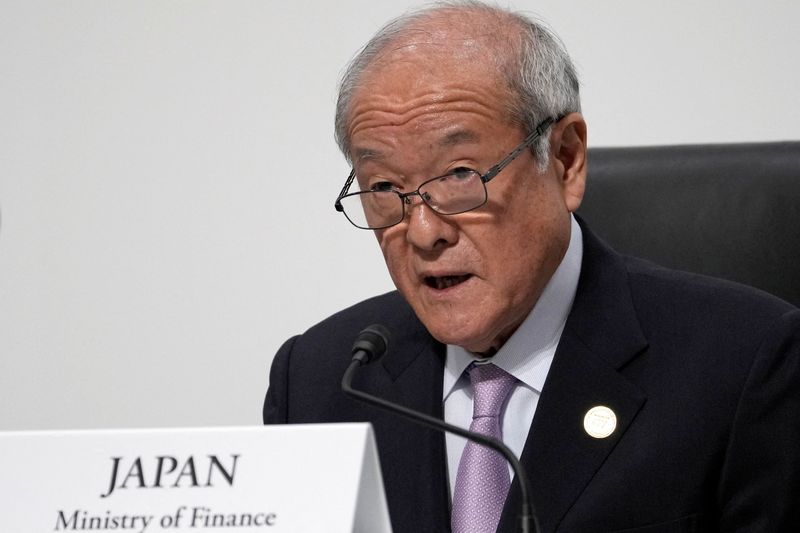
Satoshi Sugiyama and Makiko Yamazaki
TOKYO (Reuters) – Japan is concerned about the fallout from a weak yen, Finance Minister Shunichi Suzuki said on Friday, issuing a fresh warning to speculators as the currency continued to fall following a widely expected decision by the central bank to keep rates steady.
The Bank of Japan kept policy unchanged at the start of the session after a two-day meeting, triggering a spike in yen volatility as it fell to below 156 against the dollar, its lowest level since 1990.
The currency’s latest moves came as Suzuki, speaking hours before the BOJ decision, repeated his recent warnings against speculative moves in the yen, keeping traders on edge over when Tokyo might intervene in markets.
“A weak yen has both a positive and a negative impact (on the economy),” Suzuki said at a news conference, adding that he is “more concerned about the negative impact now.”
Suzuki said he could not comment on specific monetary policy measures, but authorities were closely monitoring currency movements and were prepared to take action.
While the weak yen boosts exports, it has become a headache for Japanese policymakers as it raises household costs of living through higher import prices. The finance minister said measures to combat rising prices were a key government policy priority.
The yen’s fall to a 34-year low against the firmer dollar was driven by wide differences in US and Japanese interest rates. The yen’s yield-driven slide has gained fresh momentum amid signs the Bank of Japan will be slow to raise near-zero rates and expectations the U.S. Federal Reserve will likely delay the start of its rate-cutting cycle.
remove advertising
.
INTERVENTION “USELESS”
At a press conference after the decision, Bank of Japan Governor Kazuo Ueda said little about when the next rate hike would occur.
Ueda said that while the impact of the yen’s movements was usually temporary, its impact on core inflation could not be discounted.
The yen briefly jumped against the dollar after Ueda’s briefing ended, but it was not immediately clear whether authorities had actually intervened. yearly low 156.82.
“The currency withdrawal is certainly a disappointment due to the lack of guidance from the bank,” said Rodrigo Catril, Sydney-based senior FX strategist at National Australia Bank (OTC:).
“In my opinion, what the currency market is telling us is that it believes the Bank of Japan’s policy is too loose and therefore why the currency is so weak.”
The yen’s continued weakness allowed it to comfortably break above the 152 and 155 levels against the dollar, which traders had previously seen as a line in the sand that would prompt Tokyo to intervene in markets. It has fallen about 10% against the dollar this year and has lost more than 34% of its value in three years.
Suzuki declined to comment on remarks by US Treasury Secretary Janet Yellen that the US dollar is strong and other governments’ interventions in foreign exchange markets are only appropriate in rare and extreme circumstances.
Later in the day, speaking in parliament, Suzuki said that while the level of foreign exchange reflects various factors, including economic indicators and price trends, the difference in interest rates remains the critical determining factor.
remove advertising
.
Japan last intervened in the foreign exchange market in 2022, spending an estimated $60 billion to defend the yen.
Traders believe there is little Tokyo can do to reverse the currency’s decline while interest rates and momentum are heavily skewed against it.
“(Foreign exchange) intervention in a scenario where we see upward pressure on US Treasury yields would be an exercise in futility,” NAB’s Catril said.


